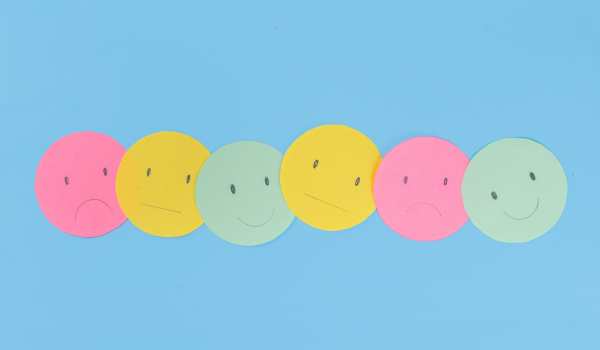1 min read
National Minority Mental Health Month with KDH Counseling
July is recognized as National Minority Mental Health Month, a crucial time to spotlight the unique challenges and resiliency within minority...
8 min read
KD HOLMES, LPC, EMDR CERTIFIED, BTTI TRAINED
:
Aug 26, 2024 4:51:05 PM

Life and daily tasks, seems impossible when you face the challenges of depression, a condition that affects millions worldwide. With a wealth of resources, expert guidance, and research, you can find effective help. From understanding the symptoms, such as persistent sadness, fatigue, and loss of interest, to exploring the broader impacts on daily life and relationships, gaining insight is the first step. Discover how therapy and medication can aid in treatment and equip you with coping strategies to manage this debilitating diagnosis effectively. Harness the power of technology with digital tools and apps designed to complement therapy, offering features like mood tracking and mindfulness exercises making mental health management more accessible and convenient for everyone. Find strength in community by connecting with others around you that share similar interests, gain encouragement, and build a network of support.
Furthermore, by integrating medication with therapy, collaborate closely with your Psychiatric Nurse Practitioner to craft a personalized plan addressing both the biological and psychological aspects of depression. This holistic approach significantly enhances the effectiveness of treatments, providing comprehensive help.
Let's walk towards resilience together, offering support and encouragement as we take actions towards a more fulfilling life.
Depression casts a significant shadow over millions worldwide, manifesting as persistent feelings of sadness and a pervasive disinterest in activities that were once enjoyable. Those affected often experience disrupted eating and sleeping habits, struggling with either excessive or insufficient sleep and appetite changes that lead to weight fluctuations. Concentration becomes difficult, affecting productivity and the ability to make decisions. These symptoms deeply affect daily life, hindering the potential for joy and fulfillment.
Beyond emotional turmoil, depression also impacts physical well-being, often leading to chronic fatigue, unexplained aches and pains, and a weakened immune system. It can strain relationships, as loved ones may struggle to understand the depth of the condition, leading to feelings of isolation for the person suffering. Work performance may also decline, increasing stress and anxiety about job security.
Recognizing these signs is crucial for seeking help and finding effective treatment paths. By understanding the comprehensive impact of depression, individuals and communities can better support those affected, fostering an environment where seeking help is encouraged and accepted.
Trauma can leave individuals feeling stuck and overwhelmed, creating a deep sense of emotional turmoil that can exacerbate the effects of depression. Symptoms of depression intensifies with a trauma history making it even more challenging to navigate daily life.
Individuals with neurological differences such as ADHD or Autism often face additional challenges when dealing with depression. The sensory overload and differences in thinking and coping can intensify the symptoms of depression, making it even more complex to treat effectively. The unique cognitive processing styles and sensory sensitivities that come with neurodivergence can further complicate the management of depression, requiring a tailored approach that takes into account these specific needs.
For individuals with ADHD, the constant struggle with attention and focus issues can intensify feelings of hopelessness and worthlessness commonly associated with depression. The impulsivity and hyperactivity characteristic of ADHD can also lead to heightened emotional responses, making it harder to regulate mood and emotions. Similarly, individuals with Autism experience differences in the way they sense and respond to the world, leading to a sense of disconnect and isolation from the neurotypical world which worsens depressive symptoms. Considering the additional pressure of neurotypical norms and expectations, individuals with neurological differences are more susceptible to an increase in symptoms.
Let's explore the dark side of depression by checking out some facts!
Exploring the grim reality of depression, it is staggering to note that approximately 700,000 individuals lose their lives to suicide each year, equating to a tragic loss every 40 seconds. Shockingly, suicide ranks as the fourth leading cause of death among 15-29-year-olds worldwide. While women tend to make more suicide attempts, it is men who tragically succumb to suicide at higher rates, with males representing about 70-80% of all suicide deaths across various regions.
In the United States, the highest suicide rates are observed among adults aged 45-64, closely followed by individuals aged 85 and older. Alarmingly, American Indian and Alaska Native populations exhibit the highest suicide rates among racial and ethnic groups in the U.S., with non-Hispanic White populations following closely behind. Factors such as depression, anxiety disorders, and substance use disorders significantly increase the risk of suicide, while issues like unemployment, financial stress, poverty, isolation, lack of social support, and a history of trauma or abuse further exacerbate this risk.
Considering these statistics, it is imperative to seek help if you have a history of trauma, experience depression, lack social support, and have suicidal thoughts. It is important not to navigate these symptoms alone and reach out to a professional.
Therapy forms a vital pillar in treating depression, offering a space to explore your inner world and develop effective therapeutic skills. This process is facilitated by Master's Degree level professionals who understand the complexities of mental health. Clinicians with Master's level degrees focus entirely on the nuance of treating mental health, these individuals are well-equipped with the tools to assist clients with their needs.
Through various therapeutic methods, therapists guide clients through learning, processing, skills building, reflection, and most importantly an honest conversation focused on change and support.
Therapy is tailored to an individual's unique needs and circumstances guided by evidenced based models, making it a highly personalized form of treatment that is scientifically driven. It can take different forms, whether it's one-on-one personal sessions, group therapy that provides shared experiences and support, or family sessions that involve loved ones in the process. Whether the focus is on addressing past traumas, managing daily stressors, or a deep interpersonal exploration, therapy serves as a guide for individuals towards self-discovery, personal growth, and ultimately empowerment.
Consistent therapy fosters greater self-awareness and resilience, providing individuals with the necessary tools to navigate life's challenges. By fostering a deeper understanding of oneself and one's relationships, therapy can effectively pave the way to a more fulfilling life.
Dialectical Behavior Therapy (DBT) stands out as an approach particularly effective for individuals grappling with intense emotions and challenges associated with depression. Rooted in the principles of mindfulness and acceptance, DBT encourages individuals to observe their thoughts and feelings without judgment. This compassionate practice fosters an environment where one can confront the tumult of emotions, learning that pain is a part of the human experience and not a reflection of personal inadequacy.
Through skills training, clients develop strategies to enhance emotional regulation, improve distress tolerance, and foster interpersonal effectiveness. This results in a gradual shift—where once there was turmoil, there is now a growing resilience. The insights gained from DBT increases understanding one's intrinsic worth and capabilities, ultimately transforming how one relates to themselves and others. As individuals learn to balance acceptance with change, they find the strength to navigate life’s challenges, moving toward a future characterized not by the weight of despair, but by the light of possibility and hope.
ACCEPTANCE AND COMMITMENT THERAPY (ACT) is another valuable approach in addressing depression, focusing on mindfulness, acceptance, and values-based actions. ACT encourages individuals to acknowledge their thoughts and emotions without judgment, allowing them to create space for these experiences while also taking steps towards living a more meaningful life. By fostering psychological flexibility, individuals can learn to respond to their inner struggles with compassion and openness, ultimately reducing the impact of depressive symptoms.
Through ACT, individuals can identify their core values and commit to taking actions that align with these values, even in the face of difficult emotions. This commitment to personal growth and values-based living can help individuals break free from the cycle of depression and move towards a more fulfilling and purposeful life. By embracing acceptance and taking committed action, individuals can cultivate resilience and develop a greater sense of well-being, even in the midst of challenges. ACT offers a unique perspective on managing depression by encouraging individuals to shift their focus from symptom reduction to creating a rich and meaningful life.
Addressing depression in individuals with neurological differences requires a comprehensive and individualized treatment plan that considers their unique challenges and strengths. By incorporating strategies that accommodate their specific cognitive and sensory needs, therapists and healthcare providers can better support these individuals' mental well-being more effectively. Through a holistic approach that embraces neurodiversity, individuals with ADHD, Autism, or other neurological differences can receive effective support.
Trauma therapy, such as Eye Movement Desensitization and Reprocessing (EMDR) and Deep Brain Reorienting (DBR), plays a crucial role in addressing the experiences that exacerbate or trigger symptoms of depression. These therapeutic approaches delve deep into the root causes of depression, which is trauma helping individuals change the brain patterns that continue to impact their mental well-being.
Additionally, trauma therapy equips individuals with coping strategies and tools to navigate the complexities of their emotions and reactions. By providing a structured therapeutic space for processing trauma, EMDR and DBR changes brain patterns (making the brain less reactive) which then can improve depressive symptoms.
Promoting mental health care and breaking down the barriers of stigma surrounding seeking help are vital pillars in preventing suicide. Suicide hotlines and crisis centers offer immediate support for individuals in distress, highlighting the importance of awareness, stigma reduction, and providing assistance to those in need. Therapy serves as a safe space for open discussions about symptoms, complemented by medication, participation in DBT groups, and in severe cases, hospitalization for individuals at risk of self-harm. Being proactive in addressing mental health concerns is key to fostering well-being and preventing crises. Make sure your therapist is trained and comfortable working with this symptom, so you receive the most effective care!
Medication plays a vital role in treating depression, as the brain's functioning can sometimes be compromised, and certain symptoms may persist despite therapeutic interventions due to biological factors. Medication can effectively reduce these symptoms, whether used as a short-term or long-term solution.
The emergence of digital tools and apps has revolutionized mental health care by providing new avenues for support and self-management. Apps like Headspace, Calm, and Moodpath offer features such as mood tracking, mindfulness exercises, and therapeutic activities, which contribute to making mental health care more accessible and personalized for users. Headspace, for example, provides guided meditation sessions that are tailored to help users cope with stress, improve focus, and enhance overall well-being. Calm offers a variety of relaxation techniques, including sleep stories and nature sounds, to aid in reducing anxiety and promoting restful sleep.
These digital tools extend their support beyond traditional therapy sessions by providing users with the convenience of accessing help at any time and place. The anonymity these apps offer is particularly appealing to those who may be hesitant to seek in-person therapy due to stigma or privacy concerns. Additionally, the ability to track progress over time encourages users to stay engaged with their mental health journey and recognize improvements.
Just a few taps on a smartphone can connect individuals to valuable resources that empower them to manage their mental health seamlessly. This ease of access ensures that support is available whenever it's needed, promoting a proactive approach to mental well-being. As digital tools continue to evolve, they hold the potential to integrate even more advanced features, further enhancing their role in mental health management.
Support from your community provides a beacon of hope for those facing depression, offering not just a sense of belonging. Finding the right community creates safe spaces where individuals can share their experiences with like-minded peers, providing an environment of understanding and solidarity. Whether joining through local organizations, participating in online forums, or engaging in social media groups, these communities offer comfort and reassurance that you're not alone.
Within these groups, shared stories foster deep connections that help break the isolation often associated with depression. Through connecting we gain insight into our experiences and discover new perspectives.
In essence, community empowers individuals to find unity and resilience. By fostering a sense of connection, they help build the strength needed to face adversity while feeling supported.
Combining medication and therapy offers a comprehensive approach to treating depression, addressing both the physiological and psychological aspects of the condition. Antidepressants play a crucial role in rebalancing brain chemicals such as serotonin and norepinephrine, which are often imbalanced in those suffering from depression. This chemical adjustment can lead to stabilization of mood, reduction in symptoms, and an overall improvement in quality of life, allowing individuals to engage more fully in daily activities.
Therapy provides a safe and supportive environment for individuals to delve into psychological exploration. Through various therapeutic methods, individuals can identify patterns that contribute to their depression. Therapy also aids in building coping strategies or skills, enhancing resilience, fostering a deeper understanding of oneself and ultimately improving one's mood.
Collaborating with healthcare providers to tailor a personalized treatment plan is essential for ensuring optimal outcomes and recovery. Each person’s experience with depression is unique, and a one-size-fits-all approach may not be effective. By working closely with professionals, individuals can create a treatment plan that addresses their specific needs and circumstances.
Regular check-ins and honest communication with healthcare professionals allow for tracking progress and making necessary adjustments to the treatment plan. This ongoing partnership empowers individuals, offering them the confidence and support needed on their mental health exploration. Evidence says by combining medication and therapy produces the best outcomes for depression. Individuals can navigate their path to recovery with a toolkit, ultimately leading to a more fulfilling life.
If you are thinking I will have some of that, message us at KDH and let's get this process going.
Helpful Blogs:
How Do I Climb Out of My Depressive Hole?
Understanding Tragedy: Why Did My Grandfather Choose to End His Life?
It's No Use Going Back to Yesterday I Was a Different Person Then
Let's Talk about Medication for Depression

1 min read
July is recognized as National Minority Mental Health Month, a crucial time to spotlight the unique challenges and resiliency within minority...

What are the necessary mental health needs of BIPOC individuals and strategies for providing culturally competent support and practical resources?

Attention-Deficit/Hyperactivity Disorder (ADHD) is often mischaracterized—reduced to images of fidgety schoolchildren or distracted professionals...